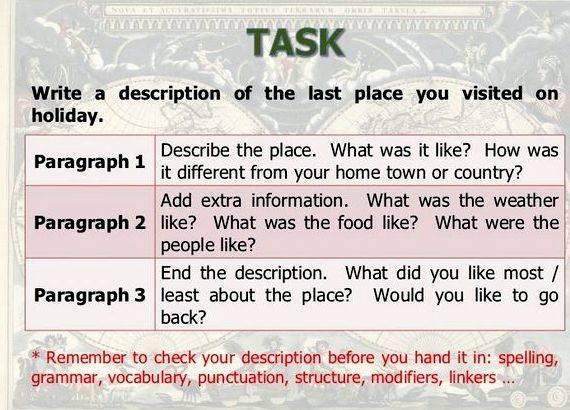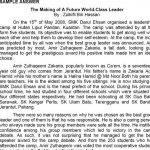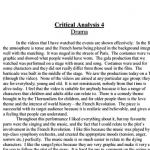Tips on Writing a Descriptive Essay
Writers use the descriptive essay to create a vivid picture of a person, place, or thing. Unlike a narrative essay, which reveals meaning through a personal story, the purpose of a descriptive essay is to reveal the meaning of a subject through detailed, sensory observation. The descriptive essay employs the power of language and all the human senses to bring a subject to life for the reader.
If readers come away from a descriptive essay with the feeling that they have really met a person, gone to a particular place, or held a certain object, the writer has done a good job. If readers also feel an emotional connection and deep appreciation for the subject’s significance, the writer has done a great job.
The Five-Step Writing Process for Descriptive Essays
Professional writers know one thing: Writing takes work. Understanding and following the proven steps of the writing process helps all writers, including students. Here are descriptive essay writing tips for each phase of the writing process:
1. Prewriting for the Descriptive Essay
In the prewriting phase of descriptive essay writing, students should take time to think about who or what they want to describe and why. Do they want to write about a person of significance in their lives, or an object or place that holds meaning? The topic doesn’t have to be famous or unusual. The person could be a grandparent, the object, a favorite toy, and the place, a tree house.
Once a topic is chosen, students should spend time thinking about the qualities they want to describe. Brainstorm about all the details associated with the topic. Even when not writing about a place, reflect on the surroundings. Where is the object located?
Where does the person live? Consider not just physical characteristics, but also what memories, feelings, and ideas the subject evokes. Memory and emotion play an important role in conveying the subject’s significance. Plan the focus of each paragraph and create an outline that puts these details into a logical sequence.
2. Drafting a Descriptive Essay
When creating the initial draft of a descriptive essay, follow the outline, but remember, the goal is to give the reader a rich experience of the subject. Keep in mind, the most important watchword of writing a descriptive essay is show, don’t tell. One of the best ways to show is to involve all of the senses—not just sight, but also hearing, touch, smell, and taste. Write so the reader will see the sunset, hear the song, smell the flowers, taste the pie, or feel the touch of a hand.
Don’t Tell…Show!
Use descriptive and figurative language, as well as concrete images to describe the subject. Similes and metaphors work well. Here are some examples:
The clock stood by our family, faithfully marking the minutes and hours of our lives.
Enjoy the process of describing the subject—it can be a rewarding experience. A descriptive essay doesn’t rely on facts and examples, but on the writer’s ability to create a mental picture for the reader.
3. Revising a Descriptive Essay
In the revision phase, students review, modify, and reorganize their work with the goal of making it the best it can be. In revising a descriptive essay, students should reread their work with these considerations in mind:
- Does the essay unfold in a way that helps the reader fully appreciate the subject? Do any paragraphs confuse more than describe?
- Does the word choice and figurative language involve the five senses and convey emotion and meaning?
- Are there enough details to give the reader a complete picture?
- Has a connection been made between the description and its meaning to the writer? Will the reader be able to identify with the conclusion made?
Always keep the reader in mind from opening to concluding paragraph. A descriptive essay must be precise in its detail, yet not get ahead of itself. It’s better to go from the general to the specific. Otherwise, the reader will have trouble building the image in their mind’s eye. For example, don’t describe a glossy coat of fur before telling the reader the essay is about a dog!
4. Editing a Descriptive Essay
At this point in the writing process, writers proofread and correct errors in grammar and mechanics. It’s also the time to improve style and clarity. Watch out for clichés and loading up on adjectives and adverbs. Having a friend read the essay helps writers see trouble spots and edit with a fresh perspective.
5. Publishing a Descriptive Essay
Sharing a descriptive essay with the rest of the class can be both exciting and a bit scary. Remember, there isn’t a writer on earth who isn’t sensitive about his or her own work. The important thing is to learn from the experience and take whatever feedback is given to make the next essay even better.
Time4Writing Teaches Descriptive Essay Writing
Time4Writing essay writing courses offer a highly effective way to learn how to write the types of essays required for school, standardized tests, and college applications. A unique online writing program for elementary, middle school, and high school students, Time4Writing breaks down the writing process into manageable chunks, easily digested by young writers. Students steadily build writing skills and confidence, guided by one-on-one instruction with a dedicated, certified teacher. Our middle school Welcome to the Essay and Advanced Essay courses teach students the fundamentals of writing well-constructed essays, including the descriptive essay. The high school Exciting Essay Writing course focuses in depth on the essay writing process with preparation for college as the goal. The courses also cover how to interpret essay writing prompts in testing situations. Read what parents are saying about their children’s writing progress in Time4Writing courses.
“I gained a lot from Time4Writing. With the help of my incredible teacher, I have brought my writing to a new level.”
Key Benefits
- Personalized writing instruction feedback from certified teachers
- Motivates aspiring writers to fine tune and develop their skills
- Helps ESL students develop a better understanding of the English language
- Ability to hone in on specific areas of writing for test prep skill sharpening





 Writing news report osslt articles
Writing news report osslt articles In the article essay writing
In the article essay writing Paid for writing articles ukiah
Paid for writing articles ukiah Award winning feature articles and writing
Award winning feature articles and writing Writing critical reviews of articles
Writing critical reviews of articles






